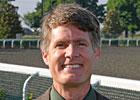(Originally published in the August 21, 2010 issue of The
Blood-Horse magazine. Feel free to share your own thoughts and
opinions at
the bottom of the column.)
By Eric Mitchell
 “You need to have passion for anything you are involved in, whether it is racing off-road cars or breeding horses—otherwise you’re just spinning your wheels...”
“You need to have passion for anything you are involved in, whether it is racing off-road cars or breeding horses—otherwise you’re just spinning your wheels...”
—Excerpt from a speech Frank “Scoop” Vessels III made while accepting the 2003 John W. Galbreath Award for Outstanding Entrepreneurship in the Equine Industry.
The crash of an Aero Commander 500-B Aug. 11 over Oregon ripped a large hole in the fabric of California’s horse community, and no one is confident it can be patched.
Missing from that space is Frank “Scoop” Vessels III, the pilot of the fatal flight and the owner of Vessels Stallion Farm near San Diego. He was an integral thread in the Golden State racing industry’s tapestry, constantly working to weave together the interests of Thoroughbred and Quarter Horse owners, breeders, trainers, track owners, and legislators. His goal was always to strengthen the fabric.
Vessels’ leadership style was not organizing rallies and shouting slogans through a bullhorn or pounding his fist on a podium during committee hearings. Instead, he reached out to people, brought them together, included everyone in the debate, and pushed for solutions.
Several weeks ago Vessels called a meeting at the Newport Bay Club for about 15 of the state’s top owners and breeders. The sole purpose was to generate new ideas for reinvigorating California’s breeding and racing industries.
“He was one of the few in this state that if everyone knew he was involved, then they knew the meeting was important and would all attend,” said Doug Burge, executive vice president of the California Thoroughbred Breeders’ Association, which Vessels served as president in 2006 and 2007.
“There was no question that if anyone was going to be able to bring people together, it was him,” said John Harris, former chairman of the California Horse Racing Board and a leading breeder and owner who attended the meeting. “He was the spark point. He had a wonderful style and was dedicated to doing it right.”
Vessels’ great talent was in building alliances, and he was so effective because he treated grooms and state senators alike. Despite being a bear of a man, he was never intimidating. He made everyone he talked to feel important and that what they said mattered. Vessels was also the eternal optimist.
“Scoop was one of those guys who didn’t care how bad things got, even if you were in the middle of it down in Mexico off-roading. He was the guy who always got it figured out and came back,” said Rich Decker, a bloodstock agent who worked for Vessels for seven years and had known him for more than 20.
Vessels came from a line of influential dreamers. His grandfather, Frank Sr., started Los Alamitos racecourse in the early 1950s, the first Quarter Horse track on the West Coast. Frank Sr. also helped Quarter Horse racing flourish by unifying the American Quarter Horse Association and the National Quarter Horse Racing Association. Vessels’ father played a big role in lobbying for legalized pari-mutuel wagering on Quarter Horses in California.
Thankfully for California, Vessels’ home state was central to his dreams too. When the family sold Los Alamitos, Vessels had the opportunity to unleash his biggest dream yet—to own a major farm that bred both Quarter Horses and Thoroughbreds.
“That may seem easy, but politically it was not—it took a long time,” Vessels said in a speech after accepting the 2003 John W. Galbreath Award for Outstanding Entrepreneurship in the Equine Industry.
As would be expected, his Quarter Horse venture got off to a faster start, and he was rewarded with champion racehorse and stallion First Down Dash, one of the first dozen horses he broke and trained on his new farm.
His Thoroughbred venture eventually blossomed with the help of In Excess, an Irish-bred grade I winner who had been parked at the farm temporarily before he was to ship to Kentucky to be sold. Vessels wound up buying half of the horse to keep him in California. Five years later In Excess’ son Indian Charlie won the 1998 Santa Anita Derby (gr. I). Vessels ignored the pressure to move the stallion to Kentucky because he was committed to improving California’s breeding program.
“To think that we could step into the Thoroughbred industry and syndicate that kind of horse shows you that I think people can do anything,” Vessels said in 2003. “When people tell you it can’t be done or try to usher you away in another direction, it all comes back to your passion. If you really believe in it, and think you can, then go ahead and do it.”
Californians need to continue embracing Vessels’ optimism, though they’ll sorely miss the messenger
“It is not just a void that’s left,” said Harris. “It is an unfillable void.”




